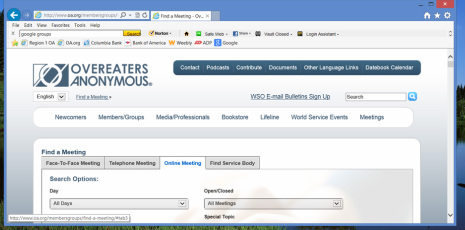Technology of Recovery
These are my ideas to assist you, some of these are unofficial OA member-to-member support and some are more official OA registered meetings. There is
always a certain possibility of breaks of anonymity when one is on the internet.
See my definition of terms at the bottom of this document.
II. Online Meetings(including Skype)*
a. These grew out of something called chat rooms. A chat room is a “space” where people sign in with a user name and type what they want to say.
b. Online meetings are official OA meetings if they are “in real time" and are conducted like “face-to-face” meetings with no cross talk and only one person sharing at a time.
c. To find online meetings go to www.oa.org and click on Find A Meeting (See Screen shots), then look for the tab Online Meetings.
III. Phone meetings
a. Official phone meetings are many people who listen together to one phone call.People connect using something called a phone “bridge” or conference call.
b. These are conducted just like face-to-face meetings with a format, 12 Steps, 12 Traditions, announcements and sharing one at a time.
IV. OA.ORG website
a. The OA.org website is an amazing resource for any OA member. (See screen shots)In addition to being able to find a meeting, connect to the Bookstore, find information for newcomers; there is;
b. Documents page www.oa.org/documents
Section headings include; A Step Ahead (within OA info); Courier(for professionals); Group Secretary Materials; Group Support (Guidelines for a Group Conscience Meeting, Group Inventory, Group Meeting Record Sheet, & How to Start a meeting), Lifeline, Meeting Formats, OA Guidelines, PI Posters, Group Registration, Service Body Support (Intergroup Inventory, Sample Bylaws, OA Bylaws Subpart A & B).
c. Datebook Calendar of OA events.
d. Other Language Links
e. Daily Meditation & What’s New
But really this only begins to give you an idea of what is there. Check it out for yourself.
V. Podcasts
a. There are podcasts available on the www.oa.org/oapodcasts/website. They can be played right from the OA website or downloaded to be played on your computer or other mp3 devise. Some are readings of OA pamphlets, some are interviews with OA members, and three of them are in Spanish.
b. The LA Intergroup has a website and there are hundreds of Speakers available to be played or downloaded. They have 4 “feeds”--- 1.) Virtual Speakers Bureau; 2.) The Long Timers Virtual Speakers; 3.) LAIG Event Speakers; and 4.) Birthday Party Virtual Speakers. Web address is http://oalaig.org/speakers-podcasts/oa-speakers.html
c. That same webpage lists other podcasts available for Boston, Kansas, Region 7, Omaha, Inland Empire, Sacramento Valley, Central New Jersey and Region 2.
d. I enjoy listening to these through my phone as I walk or drive. I have also used them as I would a speaker for a meeting.
VI. Service Body Websites
a. Service Body is the “new” term that is being used at the world level to indicate either an Intergroup, a Virtual Service Body, a Language Service Board,
etc.
b. Many service bodies now have their own websites and more and more often newcomers are finding OA via the internet.
c. OA Service Body websites usually have lots of information about meetings,
newsletter, Intergroup, events, and general information for newcomers and others about what OA is and if it might be helpful.
d. When I travel I will often use Google to search for a local OA website and get meeting information. I usually type in OA and the name of the town or area.
If that does not work I can always go to OA.org and look up meetings for the area. It is pretty cool, these days that I can often get a map to the meeting fairly easily too.
VII. Email loops
***Recently Yahoo has updated their groups and a few things function differently, especially REPLY. If you want to reply to only the person who sent the message make sure that you delete the yahoogroups address and only use the individual’s email address in the To:_________ spot.
a. One of the first ways OAers connected was using email loops. I was on some loops as early as 1995. You write one time and send it to many people at the same time. Evolved into a variety of things- today usually either recovery oriented or service group oriented.
b. For example in Oregon Intergroup we have a Yahoo group and some people VOR (Voices of Recovery), MSN groups, You can access these by going to a place online and look at a series of emails or you can simply receive email from the group.
c. Some of the “sharing only” groups try to duplicate meetings and so they turn off saving or archive.
b. Region I Yahoo Group
i. Subscribe:[email protected]
ii. Post to group: [email protected]
iii. Unsubscribe:[email protected]
Terms
Face-to-Face Meeting - a meeting with people who meet in a location in person. As opposed to a “virtual meeting” which is a phone or online meeting.
Email loop – one email goes to a group of people and only those people can reply.
Post - one email sent to a group.
Skype - a program for a computer which can send sound over
the internet so it is like a free phone call over the internet.
If there are only 2 people then they can see each other, too.
ooVoo - a program like Skype which can include several
people in video.
Yahoo group - a group on Yahoo which shares some interest.
When an individual sends email to the group all group members receive this
email. There are hundreds of Yahoo groups; shared interests include All Aboard, All Chennai Jobs, All USA Soccer, All Crafts 4 Charity, All Cuban Girls, All Chihuahuas, All things US Mariners, for example.
Podcast - an audio (or video/audio) digital file available on the internet to be played or downloaded onto an mp3 player (word comes from Apple’s iPod).

